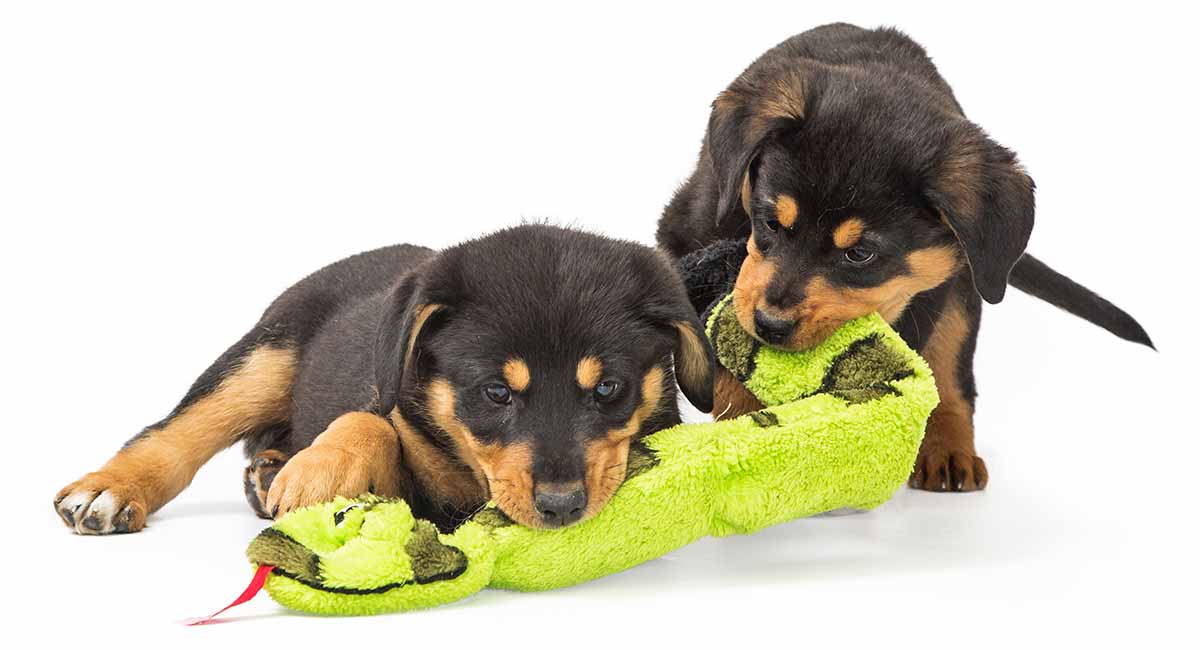
Raising a Rottweiler is an incredibly rewarding experience. This dog loves their families. They are utterly devoted, and want to remain by your side constantly. They will be loyal to and protective of their owners. With great socialization and a careful choice of parents, they can mix well with others. But they aren’t without their downsides once they reach adulthood, so it’s important you’re as happy with the rough as the smooth.
Contents
- Key characteristics
- Developing a friendly personality
- Training and exercise tips
- Finding a happy, healthy puppy
Rotties are easily bored. And when they are bored, they break stuff. They don’t like to be alone, and can develop separation anxiety if left too often. The breed can be aggressive toward strangers. And when they do attack it’s a serious business, due to their size and strength. But if you raise your Rottie puppy right, you can overcome these obstacles and have an amazing companion
History and original purpose
The history of the Rottweiler is an interesting one. Their name is thought to have been derived from the name of their German town of origin Rottweil, pronounced “Rott-Vile”.
Rottweilers were bred to accompany herds, protecting them from predators and poachers. From these routes they have been also been used to help hunting large predators such as bears, and even for pulling small carts.
In more recent years they have played roles in some countries police, military and customs departments. There were many breeds of dog put to the same use as Rottweilers, who probably make up parts of their ancestry. These include the Molossus, Bernese Mountain Dog, Greater Swiss Mountain Dog, Appenzeller and Entlebucher.
As they were involved in cattle drives, they could have potential met far more breeds along their journey. The original breed standard was compiled in 1901 in Germany.
The first Rottie was imported to the UK in 1936, however they did not gain popularity in this country until the 1960s.
Rottweiler appearance
The Rottweiler is a large, well muscled and powerful dog. They have a broad head and barrel chest, with a well proportioned body and level back. Their ears are titled and their muzzle should be long, with wide nostrils.
They should display be strong but manoeuvrability and have good endurance. Their forehead should be arched and their muzzle deep.
Colors
The classic Rottweiler is a distinctive and well known black and tan color. Rottweilers have tan eyebrow markings above their eyes, as well as on their muzzles, chests and feet.
However, as with many other breeds, it is possible to find unusual coat colors such as the Red Rottweiler, and you will occasionally come across Rottweilers with unusual eye colors or coat markings.
Sometimes these unusual colors are a result of mixed breeding but mismarks and different colors do occur in purebred dogs. This is a breed with a short, coarse, dense coat of fur and a generally neat appearance.
Shedding
Your Rottweiler will have short, easy to manage coat with a top coat and undercoat. The top coat will be medium, coarse and flat. It should be a little longer on the backs of their legs, but should never be long or wavy.
They do shed although not too much. You can get away with grooming once or twice a week to keep their coat in a good condition.
Rottweiler Size
Rottweilers are very large dogs. They can weigh up to 110 lbs and stand up to 27 inches high at the shoulder. They are packed with muscle, and as such make very strong and powerful dogs.
Temperament Traits
Rottweilers have a reputation for being tough dogs, but they are also generally very calm and biddable. Although they are undeniably dangerous in the wrong hands, this doesn’t have to be the case.
They are loyal and loving to their families, although they are also defensive of them and their homes. When well socialized, he will be a brave and confident dog.
Although he is unlikely to ever be pushy or overly friendly with people he doesn’t know. As big, powerful dogs, Rottweilers can do a lot of damage to your home if improperly managed.
Separation anxiety or sheer boredom can result in extreme chewing. If inadequately socialised your pup will almost certainly guard your home against visitors.
Loyalty vs Protectiveness
A well socialized Rottie will not be overly friendly with your guests, but will be comfortable with them coming and going. He will be affectionate with his family, but aloof with everyone else.
This is an attribute which some people love about them as a breed. But also one which has caused them to fall into trouble in the wrong hands.
For most homes where a pup is primarily a family pet, these guarding instincts can be trouble if they are improperly managed. Do not attempt to dominate your Rottweiler, instead work with him. Help him to learn that spending time with you is a happy and rewarding experience.
Rottweilers and Children
Rottweilers are not normally advised as pets for homes with young kids. Even the kindest, calmest Rottweiler is still a very big dog. This means that he could accidentally knock over a small child.
They can be wary of their visiting friends or on rare occasions mistake them for prey . Especially when confronted with their strange noises or behavior.
Puppy Socialization
Rottweiler socialisation is essential from the week that you bring your puppy home. Give your new puppy a day to settle into their house, then start on a programme of intense socialisation.
Ensure that you have at least one new visitor to the house every day. Make sure that they come with treats and lots of positive interactions for your puppy.
Help them to learn from the word go that anyone who arrives on your property is a lovely friend.
Until their vaccinations have been completed, carry your pup with you everywhere you go. Make sure they meet and interact with everyone you can. Young, old, bearded, wearing hats.
The more people your puppy sees and meets, the better.
Training your puppy
Rottweiler training is essential. Fortunately, if you use the right methods they should be relatively easy to train.
They are intelligent, co-operative dogs who are keen to work with their owners. They are also great sources of power and determination. This breed need to be steered into behaviors and manners that fit in with our human world!
Rottweilers respond very well to positive reinforcement training. Not only will it teach them good behavior, but it will help to keep their keen mind engaged as well.
Training them using motivation and enjoyable experiences is important. Guarding breeds do not respond well to punishment based methods.
Rottweiler Exercise
Exercise is very important for your pup.
He will need a couple of good walks each day, in addition to his regular training sessions.
Due to their predisposition for heart problems and obesity, keeping your Rottweiler fit and at a healthy weight is very sensible.
Health and care
Sadly, the breed has a lot of potential health problems to contend with. The most common of which are related to their bones. Hip dysplasia and elbow dysplasia are very common in this breed. Only buy a Rottie puppy from parents who both have excellent health scores.
Rottweilers have a high rate of cancer, including osteosarcoma. This is a particularly aggressive form of bone cancer that is found in several of the large and giant breeds of dog. It causes dogs to initially become lame, and as it progresses can result in amputation or sadly require euthanasia.
Other potential issues include:
- Osteochondrosis Dissecans
- Panosteitis
- Sub-Aortic Stenosis
- Thyroid Problems
- von Willebrand’s Disease (vWD)
- Progressive Retinal Atrophy (PRA)
- Bloat
Rottweilers live on average between just 8 and 9 years, according to two large studies on mortality in dogs.
Rescuing a Rottweiler
Many potential owners find the idea of rescuing appealing. You are giving a dog a second chance. And often avoid the trials and tribulations of puppy potty training. Although you will need to make sure they don’t have any bad habits that you don’t feel ready to handle.
Finding a Rottweiler puppy
Only visit breeders who are committed to full health testing, and who are happy for you to view both of the parents.
Once you have found a breeder than you are happy with, you will need to wait for them to have a litter of puppies.
Some breeders will only have one litter a year, and this will usually be in the Spring or Summer time.
It is entirely worth waiting a few months for the right puppy.
Good breeders often reserve all the pups in the litter before they are even born.
However, most will not require a deposit until they are at least three weeks old and you have had the opportunity to visit them.
Be wary of a breeder who asks for a full payment before you have had a chance to view the litter or parents.
Happy Puppies
The puppies should be playful and confident, not shying away from visitors but rushing up to greet them in a wave of fur. If you are lucky enough to have the pick of your litter, then you will need to decide whether you want a male or female puppy.
Make sure that all the pups appear to be in good health. Clear eyes, noses and free breathing is essential.
Don’t be afraid to let the breeder lead your choice when it comes to which pup to bring home from the litter. They will be the most familiar with the puppies’ temperaments.
Make sure that you meet both parents, as this is a guarding breed so a confident stable nature is essential.
Puppy Price
The price of a Rottweiler puppy will depend upon where you are located. It will be anywhere around $1,500 to $3,000.
Bear in mind that the initial buying cost of your puppy will in no way reflect the amount of money he will cost you over his life.
Ensure that you are able to budget for weekly food costs, veterinary insurance, annual vaccinations. Not to mention any one off costs including beds, toys and training equipment.
Insurance is very important for owners of Rottweilers, as they can have some very serious and expensive health problems.
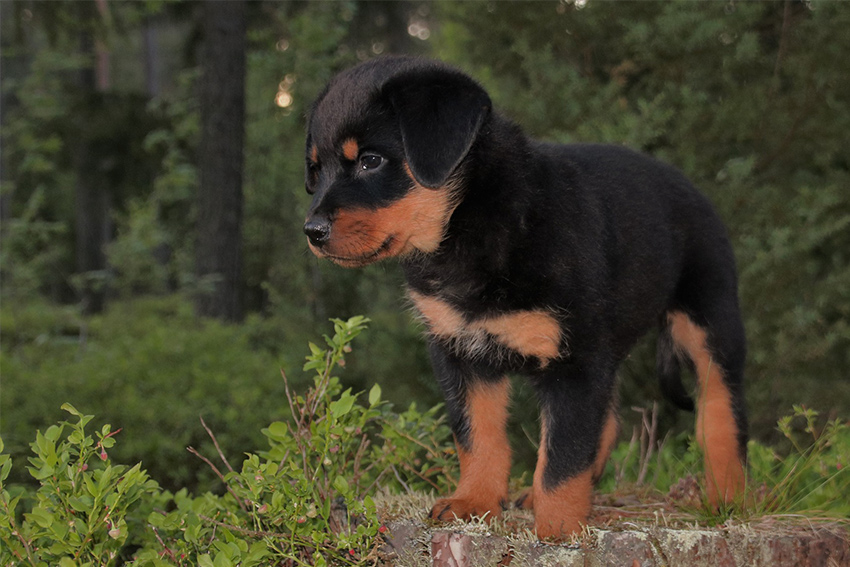
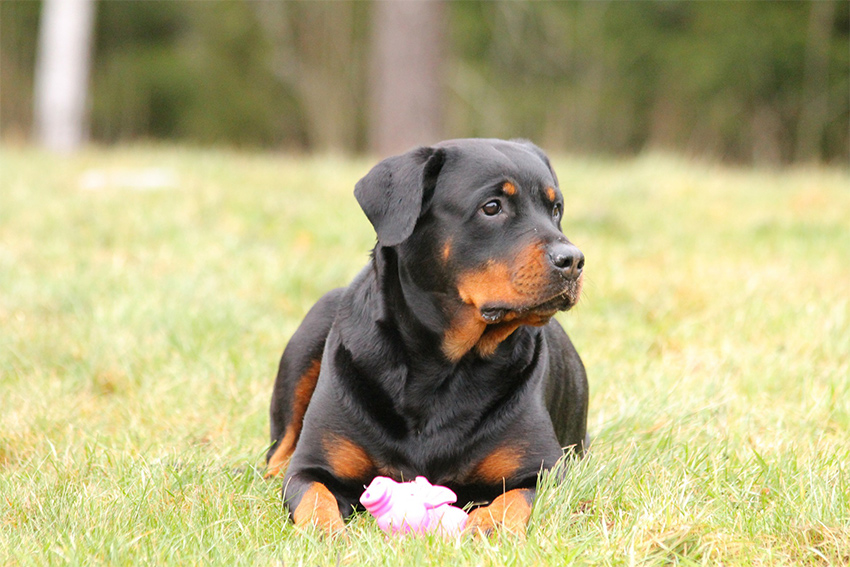
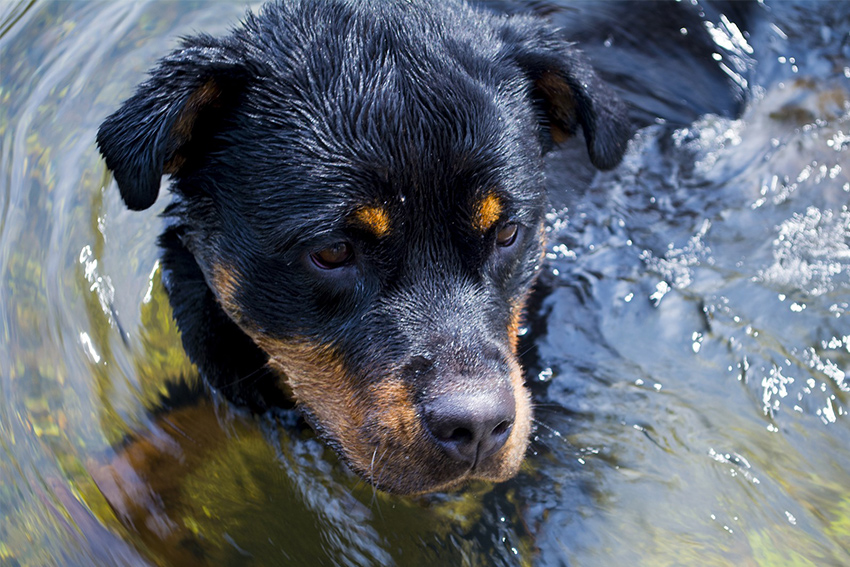
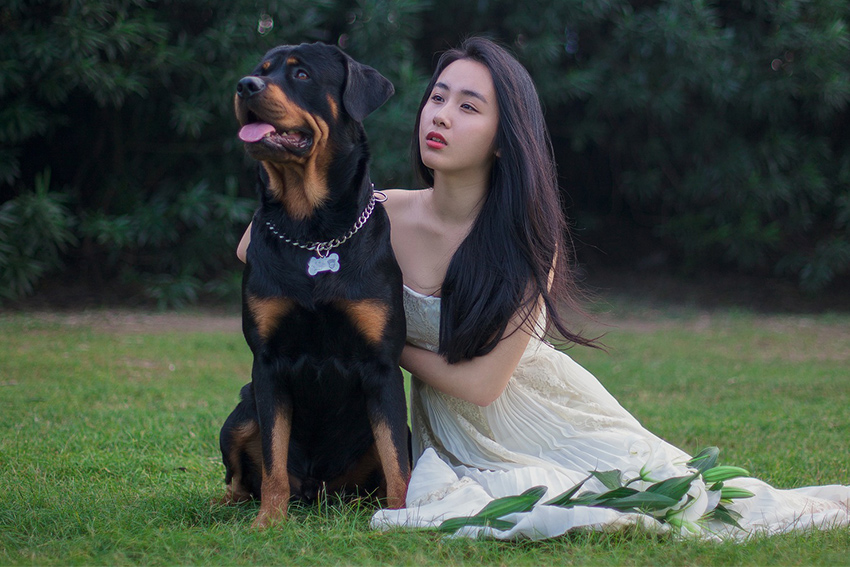
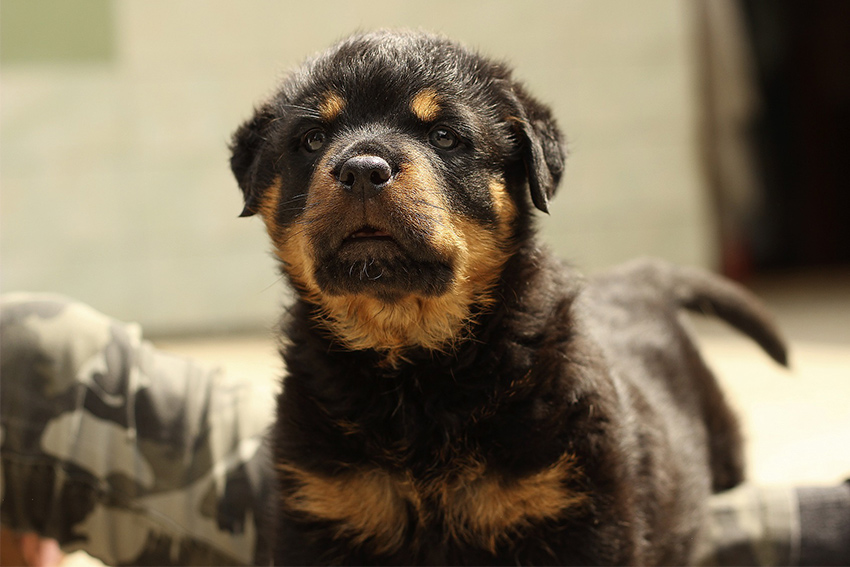

Paula Pierce says
Bort is not the only AKC Rottie that’s 13,, ours turned 13 today!
Nils Beckers says
This is great! Throughout my life I was accompanied by this breed.
I got to say this article made me laugh and smile several times because especially the passage about temperament was described perfectly.
When we had our third one, for me the first one who arrived as a puppy, he chewed on one particular shoe and one chair every time we didin’t watch him. Out of pure boredom. Anyway, it’s a great article! I love this breed. For me they are the most amazing dog breed.
Just one thing was a little confusing for me.. So far every Rottweiler we had, lived over 10 years. First one 13, second one 11 and our current one is 11 as well.
Mike says
Our ADRK registered Rottie is a medical alert/ service go for my son and is amazing in every way. Never aggressive to anyone and travels with my son on planes 3 timers a year when he goes out of the U.S. for research and treatment. He is 150LBS. But perfectly proportioned. I have to walk him as my son can’t and he is a favorite amoung the people in our neighborhood. I have never had to mussel him. He spends all night on my sons bed monitoring him for which he receives a “ frosty paws” ice cream cup the next morning.
I have a photo of him sitting by the statue of the Rottweiler in the town of Rottweil